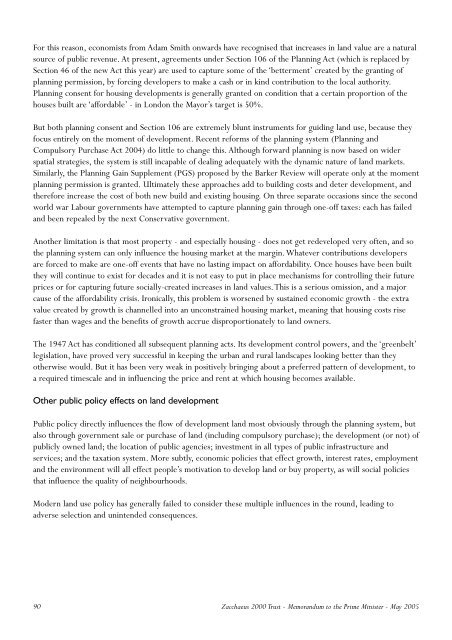Memorandum-to-the-Prime-Minister-on-Unaffordable-Housing
Memorandum-to-the-Prime-Minister-on-Unaffordable-Housing
Memorandum-to-the-Prime-Minister-on-Unaffordable-Housing
Create successful ePaper yourself
Turn your PDF publications into a flip-book with our unique Google optimized e-Paper software.
For this reas<strong>on</strong>, ec<strong>on</strong>omists from Adam Smith <strong>on</strong>wards have recognised that increases in land value are a natural<br />
source of public revenue. At present, agreements under Secti<strong>on</strong> 106 of <str<strong>on</strong>g>the</str<strong>on</strong>g> Planning Act (which is replaced by<br />
Secti<strong>on</strong> 46 of <str<strong>on</strong>g>the</str<strong>on</strong>g> new Act this year) are used <str<strong>on</strong>g>to</str<strong>on</strong>g> capture some of <str<strong>on</strong>g>the</str<strong>on</strong>g> ‘betterment’ created by <str<strong>on</strong>g>the</str<strong>on</strong>g> granting of<br />
planning permissi<strong>on</strong>, by forcing developers <str<strong>on</strong>g>to</str<strong>on</strong>g> make a cash or in kind c<strong>on</strong>tributi<strong>on</strong> <str<strong>on</strong>g>to</str<strong>on</strong>g> <str<strong>on</strong>g>the</str<strong>on</strong>g> local authority.<br />
Planning c<strong>on</strong>sent for housing developments is generally granted <strong>on</strong> c<strong>on</strong>diti<strong>on</strong> that a certain proporti<strong>on</strong> of <str<strong>on</strong>g>the</str<strong>on</strong>g><br />
houses built are ‘affordable’ - in L<strong>on</strong>d<strong>on</strong> <str<strong>on</strong>g>the</str<strong>on</strong>g> Mayor’s target is 50%.<br />
But both planning c<strong>on</strong>sent and Secti<strong>on</strong> 106 are extremely blunt instruments for guiding land use, because <str<strong>on</strong>g>the</str<strong>on</strong>g>y<br />
focus entirely <strong>on</strong> <str<strong>on</strong>g>the</str<strong>on</strong>g> moment of development. Recent reforms of <str<strong>on</strong>g>the</str<strong>on</strong>g> planning system (Planning and<br />
Compulsory Purchase Act 2004) do little <str<strong>on</strong>g>to</str<strong>on</strong>g> change this. Although forward planning is now based <strong>on</strong> wider<br />
spatial strategies, <str<strong>on</strong>g>the</str<strong>on</strong>g> system is still incapable of dealing adequately with <str<strong>on</strong>g>the</str<strong>on</strong>g> dynamic nature of land markets.<br />
Similarly, <str<strong>on</strong>g>the</str<strong>on</strong>g> Planning Gain Supplement (PGS) proposed by <str<strong>on</strong>g>the</str<strong>on</strong>g> Barker Review will operate <strong>on</strong>ly at <str<strong>on</strong>g>the</str<strong>on</strong>g> moment<br />
planning permissi<strong>on</strong> is granted. Ultimately <str<strong>on</strong>g>the</str<strong>on</strong>g>se approaches add <str<strong>on</strong>g>to</str<strong>on</strong>g> building costs and deter development, and<br />
<str<strong>on</strong>g>the</str<strong>on</strong>g>refore increase <str<strong>on</strong>g>the</str<strong>on</strong>g> cost of both new build and existing housing. On three separate occasi<strong>on</strong>s since <str<strong>on</strong>g>the</str<strong>on</strong>g> sec<strong>on</strong>d<br />
world war Labour governments have attempted <str<strong>on</strong>g>to</str<strong>on</strong>g> capture planning gain through <strong>on</strong>e-off taxes: each has failed<br />
and been repealed by <str<strong>on</strong>g>the</str<strong>on</strong>g> next C<strong>on</strong>servative government.<br />
Ano<str<strong>on</strong>g>the</str<strong>on</strong>g>r limitati<strong>on</strong> is that most property - and especially housing - does not get redeveloped very often, and so<br />
<str<strong>on</strong>g>the</str<strong>on</strong>g> planning system can <strong>on</strong>ly influence <str<strong>on</strong>g>the</str<strong>on</strong>g> housing market at <str<strong>on</strong>g>the</str<strong>on</strong>g> margin.Whatever c<strong>on</strong>tributi<strong>on</strong>s developers<br />
are forced <str<strong>on</strong>g>to</str<strong>on</strong>g> make are <strong>on</strong>e-off events that have no lasting impact <strong>on</strong> affordability. Once houses have been built<br />
<str<strong>on</strong>g>the</str<strong>on</strong>g>y will c<strong>on</strong>tinue <str<strong>on</strong>g>to</str<strong>on</strong>g> exist for decades and it is not easy <str<strong>on</strong>g>to</str<strong>on</strong>g> put in place mechanisms for c<strong>on</strong>trolling <str<strong>on</strong>g>the</str<strong>on</strong>g>ir future<br />
prices or for capturing future socially-created increases in land values.This is a serious omissi<strong>on</strong>, and a major<br />
cause of <str<strong>on</strong>g>the</str<strong>on</strong>g> affordability crisis. Ir<strong>on</strong>ically, this problem is worsened by sustained ec<strong>on</strong>omic growth - <str<strong>on</strong>g>the</str<strong>on</strong>g> extra<br />
value created by growth is channelled in<str<strong>on</strong>g>to</str<strong>on</strong>g> an unc<strong>on</strong>strained housing market, meaning that housing costs rise<br />
faster than wages and <str<strong>on</strong>g>the</str<strong>on</strong>g> benefits of growth accrue disproporti<strong>on</strong>ately <str<strong>on</strong>g>to</str<strong>on</strong>g> land owners.<br />
The 1947 Act has c<strong>on</strong>diti<strong>on</strong>ed all subsequent planning acts. Its development c<strong>on</strong>trol powers, and <str<strong>on</strong>g>the</str<strong>on</strong>g> ‘greenbelt’<br />
legislati<strong>on</strong>, have proved very successful in keeping <str<strong>on</strong>g>the</str<strong>on</strong>g> urban and rural landscapes looking better than <str<strong>on</strong>g>the</str<strong>on</strong>g>y<br />
o<str<strong>on</strong>g>the</str<strong>on</strong>g>rwise would. But it has been very weak in positively bringing about a preferred pattern of development, <str<strong>on</strong>g>to</str<strong>on</strong>g><br />
a required timescale and in influencing <str<strong>on</strong>g>the</str<strong>on</strong>g> price and rent at which housing becomes available.<br />
O<str<strong>on</strong>g>the</str<strong>on</strong>g>r public policy effects <strong>on</strong> land development<br />
Public policy directly influences <str<strong>on</strong>g>the</str<strong>on</strong>g> flow of development land most obviously through <str<strong>on</strong>g>the</str<strong>on</strong>g> planning system, but<br />
also through government sale or purchase of land (including compulsory purchase); <str<strong>on</strong>g>the</str<strong>on</strong>g> development (or not) of<br />
publicly owned land; <str<strong>on</strong>g>the</str<strong>on</strong>g> locati<strong>on</strong> of public agencies; investment in all types of public infrastructure and<br />
services; and <str<strong>on</strong>g>the</str<strong>on</strong>g> taxati<strong>on</strong> system. More subtly, ec<strong>on</strong>omic policies that effect growth, interest rates, employment<br />
and <str<strong>on</strong>g>the</str<strong>on</strong>g> envir<strong>on</strong>ment will all effect people’s motivati<strong>on</strong> <str<strong>on</strong>g>to</str<strong>on</strong>g> develop land or buy property, as will social policies<br />
that influence <str<strong>on</strong>g>the</str<strong>on</strong>g> quality of neighbourhoods.<br />
Modern land use policy has generally failed <str<strong>on</strong>g>to</str<strong>on</strong>g> c<strong>on</strong>sider <str<strong>on</strong>g>the</str<strong>on</strong>g>se multiple influences in <str<strong>on</strong>g>the</str<strong>on</strong>g> round, leading <str<strong>on</strong>g>to</str<strong>on</strong>g><br />
adverse selecti<strong>on</strong> and unintended c<strong>on</strong>sequences.<br />
90<br />
Zacchaeus 2000 Trust - <str<strong>on</strong>g>Memorandum</str<strong>on</strong>g> <str<strong>on</strong>g>to</str<strong>on</strong>g> <str<strong>on</strong>g>the</str<strong>on</strong>g> <str<strong>on</strong>g>Prime</str<strong>on</strong>g> <str<strong>on</strong>g>Minister</str<strong>on</strong>g> - May 2005




